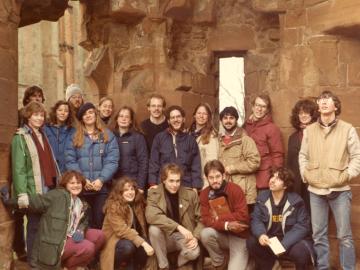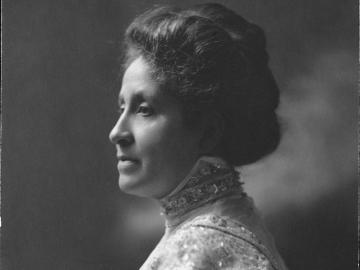Oberlin Alumni Magazine
Still Hot, Still Cool
January 24, 2023
Erich Burnett

In some ways, Jim Neumann ’58 still pictures Oberlin as he did in the mid-1950s, back when he was an undergrad studying science and obsessing over jazz on a campus that, at least outwardly, greeted such music rather coolly.
To some, jazz signaled a decadent departure from the European masters who had inspired the work of conservatory faculty and students for more than a century. But there were also students smitten by the form, and there was a student organization empowered to deliver jazz greats to Oberlin’s stages, much as the Oberlin Jazz Society does today.
Among those leading the charge was Neumann, a suburban Chicago kid who toted his ever-expanding record collection to campus and spun them on “Jazz Hot and Cool!” the WOBC radio program he hosted from the third floor of Wilder Hall.
I’m a passionate collector. It’s a problem I have.
Neumann himself doesn’t remember exactly how it all started, but it happened sometime around high school. That’s when a throughline of jazz took hold and hasn’t eased up in the seven decades that have followed.
“My folks were very disappointed that I was interested in jazz,” he says, still the slightest bit sheepish about the topic. Neumann went on to a career managing the family metalcraft business, but his unyielding passion persisted. With his wife, Susan, he amassed a cache of recordings and memorabilia that is widely considered the largest privately owned jazz collection in the world. “I’m a passionate collector,” he notes with a wry smile. “It’s a problem I have. You have people that don’t and people that do. I was obsessive. Let’s put it that way.”
In 2011, he established the James R. and Susan Neumann Jazz Collection at Oberlin, one of numerous Special Collections maintained by Oberlin College Libraries. It consists of some 100,000-plus LP records, as well as photographs, books, posters, autographs, and more—an exhaustive archive of jazz history, housed in the conservatory’s Kohl Building and placed at the fingertips of Oberlin researchers. Thousands of additional artifacts—most notably Neumann’s similarly voluminous CD collection—remain in Chicago for now, awaiting their journey to Oberlin.

But the Neumanns’ largesse has taken on a considerable new dimension.
In early 2022, they further amplified the awesome potential of jazz study at Oberlin with a gift of $1.6 million that provides for the ongoing appointment of a postdoctoral fellow in jazz history. It’s the first role of its kind at Oberlin, a sort of key to unlock the boundless potential of the Neumann Collection.
The first Neumann Postdoctoral Fellow is John Petrucelli, a saxophonist, composer, and educator whose two-year appointment began in fall 2022. Honored in 2019 by the Jazz Education Network for outstanding contributions to the profession, Petrucelli arrived with big plans for the Neumann Collection. His research here includes a deep dive into Bee Hive Records, the label Neumann founded with his wife in the mid-1970s, which will serve as a case study for the influence of small American record labels on the global jazz tradition. Petrucelli has devised two courses, including Music, Media, and the Archive: Jazz Collections at Oberlin, through which students research and curate public exhibitions using artifacts from the collection.

“I feel as though I'm coming to Oberlin College and Conservatory with a blank slate,” says Petrucelli. “What is most intriguing about this opportunity is the ability to collaborate with world-class faculty across the college and conservatory while pursuing new avenues in my research, pedagogy, and performance practice that will be inspired through the Neumann Collection.”
The Neumanns’ endowment of the fellowship coincides with news of a newly developed minor in African American music, created in tandem with the conservatory and the College of Arts and Sciences. Last spring, musicologist Courtney-Savali Andrews was appointed to a new tenure-track faculty position in African American and African diasporic music.
When it comes to jazz, Oberlin has long since lost its resemblance to the campus Neumann knew as a student. And Neumann himself is delighted to see his lifelong love now stoking the passion of new generations.
“The fact that Oberlin has embraced this the way it has, it’s been an incredible inspiration to know this stuff will live on past me,” he says. “It’s unbelievable. It’s something you just can’t put into words.”
The postdoctoral fellowship in jazz history continues Oberlin’s ongoing efforts to expand curricular diversity and support inclusion. Learn more at the Presidential Initiative on Racial Equity and Diversity website.
You may also like…
Voices Carry
March 13, 2025
Grammy-certified vocalist and viola da gamba player Ari Mason ’14 finds her niche in video games, films, and a vocal library.
London Calling
March 13, 2025
For Tracy Chevalier ’84, the Oberlin-In-London program was a magical, intense period of cultural and intellectual stimulation. As the beloved study-away experience celebrates 50 years, the New York Times best-selling author looks back on the semester she spent studying and living in London.
A Banner Held High
February 26, 2025
In 2018, Oberlin College named its main library after civil rights leader Mary Church Terrell, Class of 1884.


